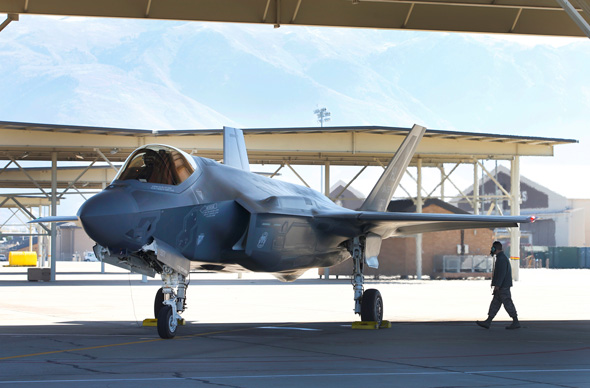Report: Secret clause of Israel-UAE deal lifts U.S. embargo on sale of F-35s to the Gulf state
UAE ruler conditioned the peace deal on its ability to purchase advanced weapons system; Prime Minister’s Office says Israel hasn’t changed its policy
According to the report, the deal in which the UAE would purchase tens of billions of dollars worth of F-35 fighter jets, advanced UAVs, and more, which was long frozen due to Israel’s objections, is now able to go ahead.
 A Lockheed Martin made F-35. Photo: Bloomberg
A Lockheed Martin made F-35. Photo: Bloomberg The report, however, claims that not only was the arms deal part of the talks, it was a clause that the UAE’s leaders insisted on, with the country’s ruler stating that without it the agreement would not go ahead.
The U.S. has long been committed to ensuring Israel’s technological edge in the region and for that reason, the U.S. Congress had placed an embargo on the sale of strategic weapons systems to Saudi Arabia and the UAE, even blocking a plan to do so by President Donald Trump.
- Israeli-based Pluristem and Abu Dhabi Stem Cells Center sign deal to collaborate in development of cell therapies
- “We will see dozens of interactions over the next few months that will grow into hundreds next year,” Jon Medved says of UAE ties
- Before the ink dries: Everything you need to know about the UAE’s economy
Chiefly, Barnea criticized Netanyahu for keeping the agreement secret, even from his political allies, specifically Defense Minister and Substitute Prime Minister Benny Gantz, the leader of the Blue and White party. Netanyahu, he wrote, explained that he was afraid Gantz and Foreign Minister Gabi Ashkenazi (also from the rival Blue and White party) would leak the details, putting the agreement at risk.
Barnea further slammed Netanyahu for not informing the defense establishment of the secret clause, arguing that Israel’s military and defense agencies must sign off on any deal that involves the sale of advanced weaponry to third countries. He noted that Netanyahu allegedly took the same route in the past when agreeing for Germany to sell Egypt advanced submarines.
The problem with Israel’s silent acquiescence to the arms deal is the precedent it sets, Barnea concluded. Other countries, primarily Saudi Arabia, may condition any step towards normalization on the removal of the embargo on the sale of the most advanced weapons systems in the U.S. arsenal.
This isn’t a case of peace in return for peace or even peace in return for freeing annexation of the West Bank, Barnea argues. “From now on, say normalization in return for weapons.”



